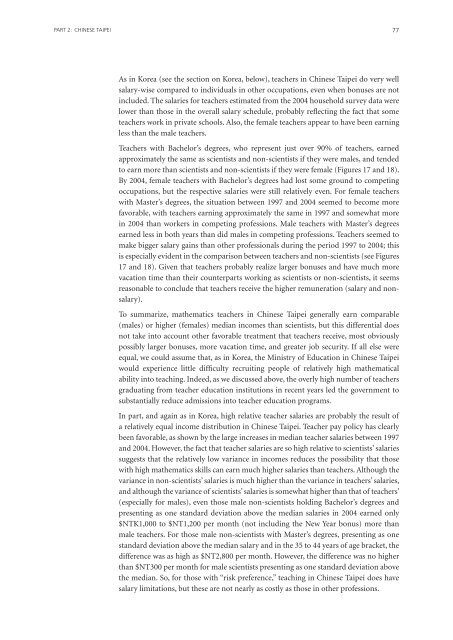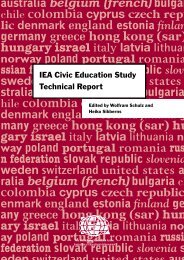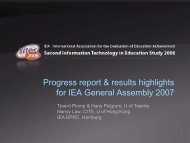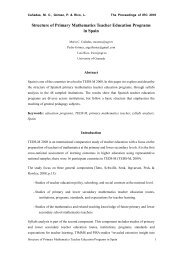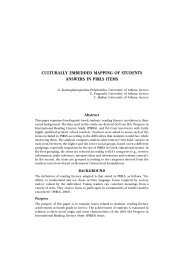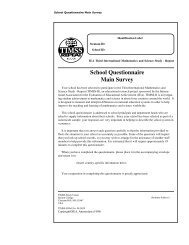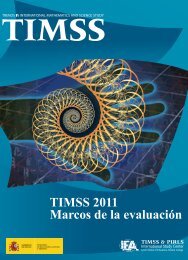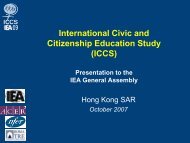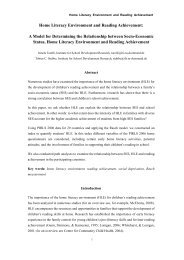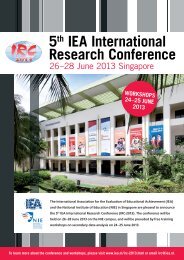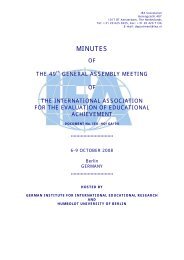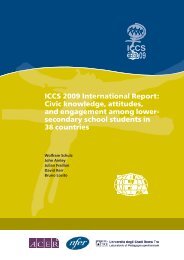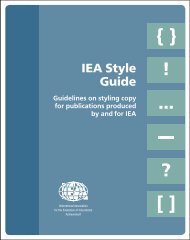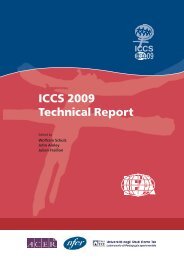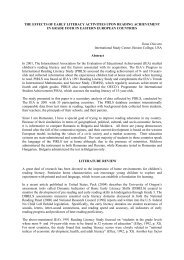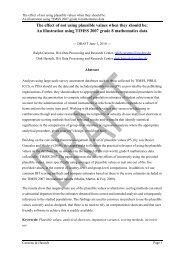Teacher Education and Development Study in Mathematics - IEA
Teacher Education and Development Study in Mathematics - IEA
Teacher Education and Development Study in Mathematics - IEA
Create successful ePaper yourself
Turn your PDF publications into a flip-book with our unique Google optimized e-Paper software.
PART 2: CHINESE TAIPEI<br />
77<br />
As <strong>in</strong> Korea (see the section on Korea, below), teachers <strong>in</strong> Ch<strong>in</strong>ese Taipei do very well<br />
salary-wise compared to <strong>in</strong>dividuals <strong>in</strong> other occupations, even when bonuses are not<br />
<strong>in</strong>cluded. The salaries for teachers estimated from the 2004 household survey data were<br />
lower than those <strong>in</strong> the overall salary schedule, probably reflect<strong>in</strong>g the fact that some<br />
teachers work <strong>in</strong> private schools. Also, the female teachers appear to have been earn<strong>in</strong>g<br />
less than the male teachers.<br />
<strong>Teacher</strong>s with Bachelor’s degrees, who represent just over 90% of teachers, earned<br />
approximately the same as scientists <strong>and</strong> non-scientists if they were males, <strong>and</strong> tended<br />
to earn more than scientists <strong>and</strong> non-scientists if they were female (Figures 17 <strong>and</strong> 18).<br />
By 2004, female teachers with Bachelor’s degrees had lost some ground to compet<strong>in</strong>g<br />
occupations, but the respective salaries were still relatively even. For female teachers<br />
with Master’s degrees, the situation between 1997 <strong>and</strong> 2004 seemed to become more<br />
favorable, with teachers earn<strong>in</strong>g approximately the same <strong>in</strong> 1997 <strong>and</strong> somewhat more<br />
<strong>in</strong> 2004 than workers <strong>in</strong> compet<strong>in</strong>g professions. Male teachers with Master’s degrees<br />
earned less <strong>in</strong> both years than did males <strong>in</strong> compet<strong>in</strong>g professions. <strong>Teacher</strong>s seemed to<br />
make bigger salary ga<strong>in</strong>s than other professionals dur<strong>in</strong>g the period 1997 to 2004; this<br />
is especially evident <strong>in</strong> the comparison between teachers <strong>and</strong> non-scientists (see Figures<br />
17 <strong>and</strong> 18). Given that teachers probably realize larger bonuses <strong>and</strong> have much more<br />
vacation time than their counterparts work<strong>in</strong>g as scientists or non-scientists, it seems<br />
reasonable to conclude that teachers receive the higher remuneration (salary <strong>and</strong> nonsalary).<br />
To summarize, mathematics teachers <strong>in</strong> Ch<strong>in</strong>ese Taipei generally earn comparable<br />
(males) or higher (females) median <strong>in</strong>comes than scientists, but this differential does<br />
not take <strong>in</strong>to account other favorable treatment that teachers receive, most obviously<br />
possibly larger bonuses, more vacation time, <strong>and</strong> greater job security. If all else were<br />
equal, we could assume that, as <strong>in</strong> Korea, the M<strong>in</strong>istry of <strong>Education</strong> <strong>in</strong> Ch<strong>in</strong>ese Taipei<br />
would experience little difficulty recruit<strong>in</strong>g people of relatively high mathematical<br />
ability <strong>in</strong>to teach<strong>in</strong>g. Indeed, as we discussed above, the overly high number of teachers<br />
graduat<strong>in</strong>g from teacher education <strong>in</strong>stitutions <strong>in</strong> recent years led the government to<br />
substantially reduce admissions <strong>in</strong>to teacher education programs.<br />
In part, <strong>and</strong> aga<strong>in</strong> as <strong>in</strong> Korea, high relative teacher salaries are probably the result of<br />
a relatively equal <strong>in</strong>come distribution <strong>in</strong> Ch<strong>in</strong>ese Taipei. <strong>Teacher</strong> pay policy has clearly<br />
been favorable, as shown by the large <strong>in</strong>creases <strong>in</strong> median teacher salaries between 1997<br />
<strong>and</strong> 2004. However, the fact that teacher salaries are so high relative to scientists’ salaries<br />
suggests that the relatively low variance <strong>in</strong> <strong>in</strong>comes reduces the possibility that those<br />
with high mathematics skills can earn much higher salaries than teachers. Although the<br />
variance <strong>in</strong> non-scientists’ salaries is much higher than the variance <strong>in</strong> teachers’ salaries,<br />
<strong>and</strong> although the variance of scientists’ salaries is somewhat higher than that of teachers’<br />
(especially for males), even those male non-scientists hold<strong>in</strong>g Bachelor’s degrees <strong>and</strong><br />
present<strong>in</strong>g as one st<strong>and</strong>ard deviation above the median salaries <strong>in</strong> 2004 earned only<br />
$NTK1,000 to $NT1,200 per month (not <strong>in</strong>clud<strong>in</strong>g the New Year bonus) more than<br />
male teachers. For those male non-scientists with Master’s degrees, present<strong>in</strong>g as one<br />
st<strong>and</strong>ard deviation above the median salary <strong>and</strong> <strong>in</strong> the 35 to 44 years of age bracket, the<br />
difference was as high as $NT2,800 per month. However, the difference was no higher<br />
than $NT300 per month for male scientists present<strong>in</strong>g as one st<strong>and</strong>ard deviation above<br />
the median. So, for those with “risk preference,” teach<strong>in</strong>g <strong>in</strong> Ch<strong>in</strong>ese Taipei does have<br />
salary limitations, but these are not nearly as costly as those <strong>in</strong> other professions.


